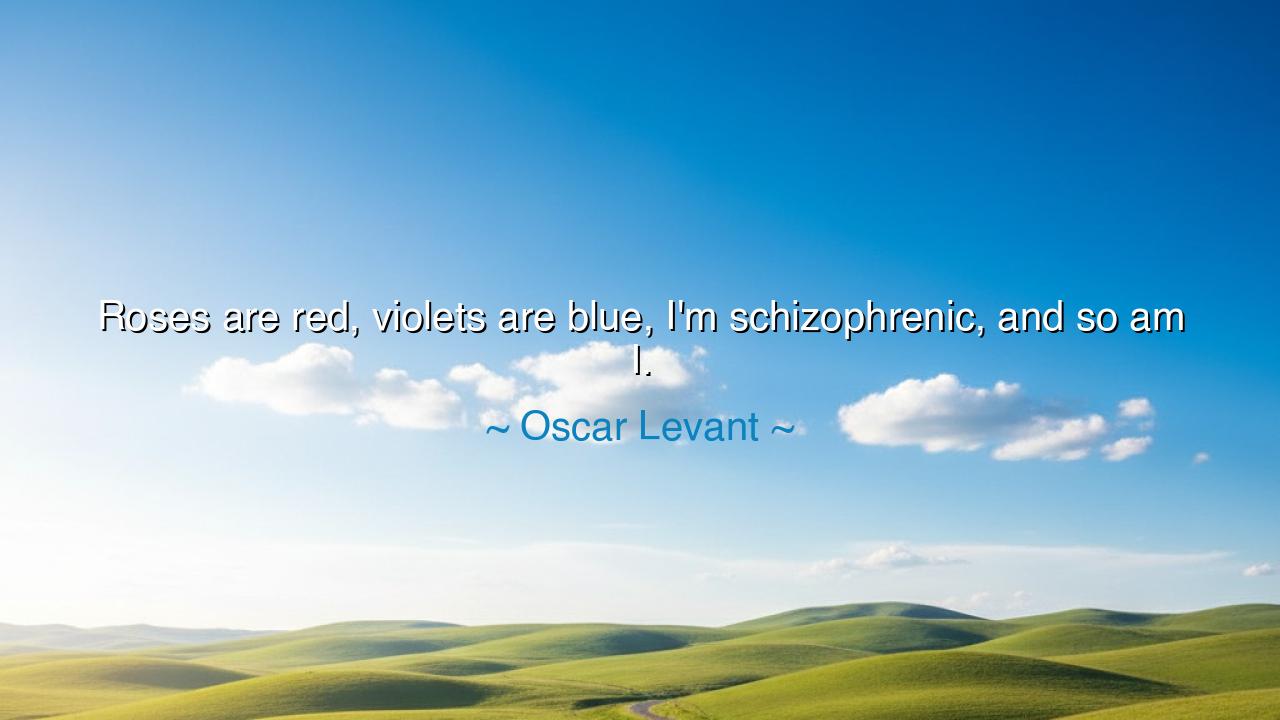
Roses are red, violets are blue, I'm schizophrenic, and so am I.






Listen, O children of the earth, to the words of Oscar Levant, who, with wit and a touch of sadness, spoke: "Roses are red, violets are blue, I'm schizophrenic, and so am I." These words, crafted with both humor and an unsettling honesty, speak to the complexity of the human mind and the delicate balance between sanity and insanity. Levant, a brilliant and troubled man of his time, used humor to reflect on his own struggles with mental health, pointing out the paradox of living with a mind that can be both the source of great creativity and great suffering.
In the ancient world, the mind was considered both a gift and a mystery. Socrates pondered the nature of the soul, seeking to understand not only the essence of truth, but the very nature of thought itself. He often asked, “Know thyself,” urging individuals to seek a deeper understanding of their inner world. Yet, as much as the ancient philosophers sought wisdom, they too understood the fragility of the human mind. Mental struggles were often hidden beneath the surface, and those who suffered from disorders of the mind were sometimes labeled as mad or possessed. In this sense, Levant’s words are a modern reflection on what has long been a challenge for humanity—the battle within the mind and the search for self-understanding in the midst of mental turmoil.
Consider the story of King Saul of Israel, whose mental struggles are well documented in the Bible. Saul, once a powerful and respected leader, became increasingly tormented by unseen forces—his mind turning against him. He experienced bouts of madness, at one point being plagued by an evil spirit that led him to irrational actions. Even though Saul was a king, his inner demons showed that power and status could not shield one from the vulnerabilities of the human mind. His story is a poignant reminder of how the mind’s fragility can affect even the most powerful, and Levant’s playful yet profound words speak to this universal truth: the mind, like the body, is mysterious, unpredictable, and sometimes even contradictory.
Levant’s quote, with its paradoxical humor, also draws attention to the inner conflict that can arise when one is caught between self-awareness and self-doubt. The phrase "so am I" reflects a sense of duality—the tension between the different voices and perspectives within one’s own mind. Schizophrenia, which Levant humorously references, is a disorder where the boundaries between reality and delusion blur, leading the sufferer to experience a fractured sense of self. Levant, though speaking in jest, reveals a deep truth about the human condition: that the mind, at times, can seem like a battlefield, where multiple versions of oneself fight for control.
Consider the story of Vincent van Gogh, the great painter whose mental struggles have become a central part of his legacy. Van Gogh’s letters to his brother reveal the torment he endured, as his genius was often intertwined with his madness. Yet, even in his darkest moments, Van Gogh produced some of the most profound works of art in history. His suffering gave birth to a new way of seeing the world—his pain became the language of his creativity. Levant’s words echo this tragic yet beautiful duality: the mind, when in conflict, can create both destruction and creation, and the person who suffers may also be the one who builds something profound from that suffering.
The lesson here, O children of the earth, is one of acceptance and understanding. Levant’s humor teaches us that even in the face of mental turmoil, we must find ways to live with our inner contradictions. Just as Socrates advised us to know ourselves, we must also accept that knowledge of the self does not always bring clarity—it may bring conflict, duality, and struggle. Yet, through these struggles, we may also find the space to create, to understand, and to evolve. Mental health is as important as physical health, and just as the body can suffer, so too can the mind.
In your own lives, O seekers of wisdom, remember that mental health is an integral part of your being. Do not shy away from the complexity of your thoughts, but seek understanding in the face of conflict. Levant’s playful words remind us that the mind is fragile, and yet, powerful—capable of both struggle and greatness. If you find yourself torn between self-doubt and self-awareness, understand that this is a part of the human experience. Seek support, understand your mind, and remember that, just as Van Gogh found expression through his struggles, so too can you find your voice in the midst of your inner battles.
Know this, O children of the earth, the mind is both a mystery and a guide. It is fragile, yet resilient. Like Levant, who laughed at the paradoxes of his own mind, we must learn to live with our inner complexities. Do not fear the contradictions within, for they may lead you to greater understanding, creativity, and compassion for others who walk a similar path. In the battle of the mind, the greatest victory is not in conquering or denying it, but in embracing its complexity and learning from its depths.






AAdministratorAdministrator
Welcome, honored guests. Please leave a comment, we will respond soon